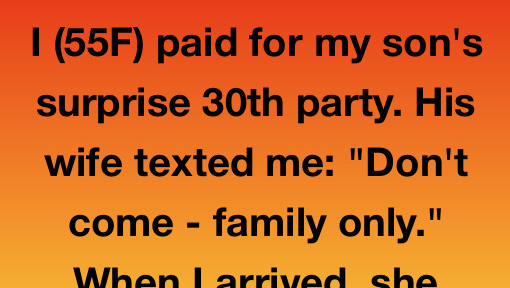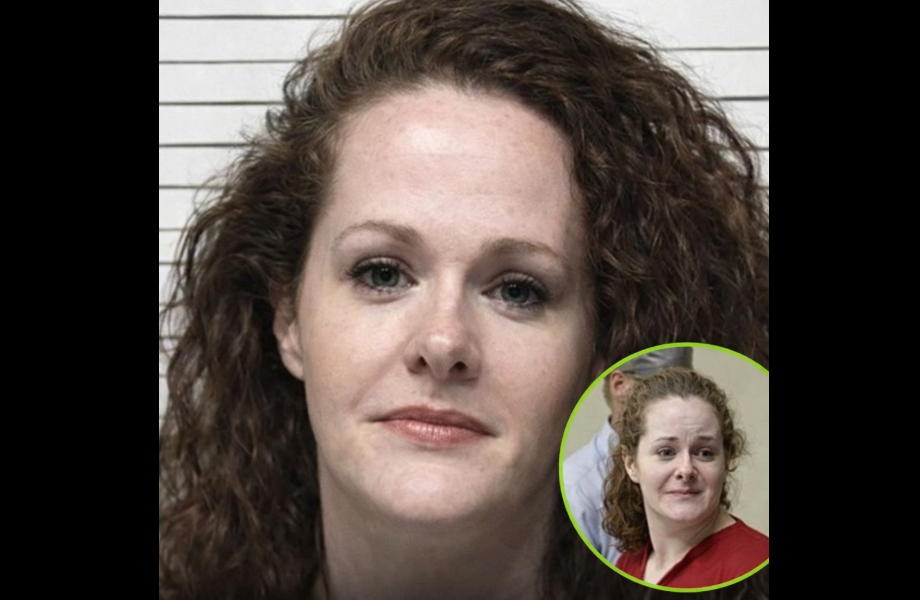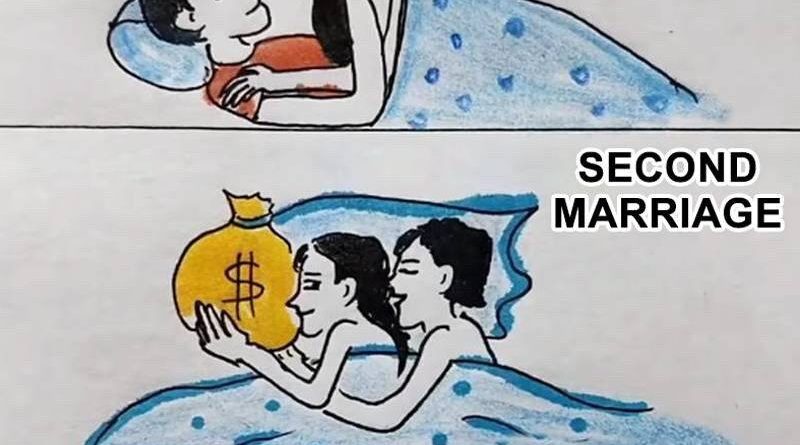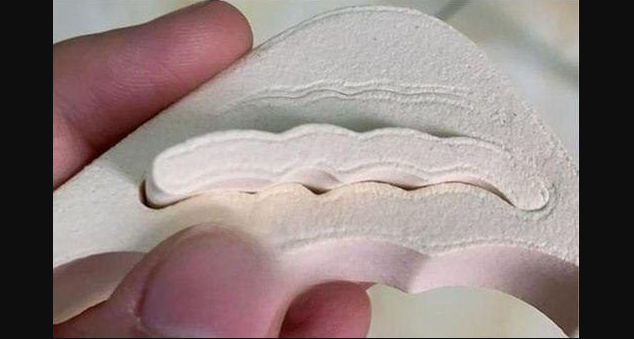I (55F) funded a grand surprise for my son’s 30th birthday celebration. His wife sent me a curt text: “Stay away – family only.” When I arrived at the venue, she stood firm at the entrance, her voice sharp: “Leave now!” My son lingered behind her, wordless. So, without a hint to them, I turned and walked away. Not before casting her a glance she couldn’t fully decipher—steady, resolute, as if I’d stepped beyond their boundaries for good.
On the drive home, tears didn’t fall. Shock didn’t grip me either. Disappointment settled in, yes. Pain? Certainly. But above all, I felt… weary. This wasn’t the first time my daughter-in-law had drawn a clear divide. It began subtly—cutting remarks during family gatherings, unread messages, sharp corrections in front of others. I once thought she needed time to adjust. Perhaps I was too much. So I stepped back, giving space.
Then came the milestones—birthdays, holidays, anniversaries. Suddenly, their Thanksgiving was “only for the two of them this year.” Or the baby shower for her sister, where my offer to help was dismissed. I told myself, “They’re young, they’ll come around.”
But being barred from my son’s birthday, which I had paid for? That cut deeper than ever.
I’d reserved the venue months in advance—a charming Italian restaurant adorned with fairy lights and a cozy outdoor patio. My son always adored pasta and classic Sinatra tunes, so I knew it would suit him perfectly. I organized the catering, the music, even a custom cake featuring photos from his childhood. It wasn’t about grandeur. It was about love.
The guest list? She insisted on managing it. Said she’d handle the invitations. I assumed she’d include family, perhaps a few close friends. I never imagined I’d be excluded.
That evening, I sat at my kitchen table, my tea growing cold. No tears came. Only an empty ache where pride once stood. My phone hummed with messages from my sister and cousins, asking if I was at the party, wondering where I’d gone. I left them unanswered. I didn’t want to pull others into the hurt.
The next morning, I rose early. A quiet calm had settled over me, like a switch had flipped. I stepped into the backyard, barefoot, the cool dew soaking my socks. Birds sang, the neighbor’s dog barked as usual, and I stood still, breathing in the dawn.
Then I made a choice.
I phoned a lawyer friend, asking a few questions. Not to pursue legal action, no. I simply wanted clarity—about gifting laws, about my rights when I’d funded an event and was denied entry.
The call was short but illuminating.
In the days that followed, I gathered all the keepsakes I’d saved for my son—baby blankets, his first shoes, kindergarten sketches, high school football trophies. I’d held onto them, believing he’d want them for his future children. Now, doubt crept in.
I wrote a letter.
It wasn’t laced with anger or veiled resentment. It was honest—detailing my feelings, the events, and what I needed for my own peace. I told him I loved him, always would, but I could no longer linger at the edge of his life, waiting to be noticed.
I mailed the letter with the box of memories.
Then I did something unexpected.
I began to live again.
I joined a local walking group at the community center. Took a weekend getaway with two lifelong friends. Enrolled in a painting class. Simple things, nothing extravagant. They reminded me I was a person before I was “Mom.” Slowly, my days stopped circling around hopes for a call or an apology.
Weeks passed. Then months.
Occasionally, I’d hear updates from mutual acquaintances. My son had earned a promotion. They’d taken a cruise. They were planning for a child. I smiled politely when his name came up, but I didn’t reach out. I gave him space. I gave myself freedom.
Then, one morning, a knock came at my door.
It was a Sunday. I was still in my bathrobe, hair tied up, sipping coffee on the couch. I opened the door, and there he stood. My son. Alone.
He looked different. Worn, perhaps. Or simply older.
“Hi, Mom,” he said.
Unsure of what to say, I stepped aside and let him in.
He sat at the kitchen table—the same one I’d sat at alone on his birthday. For a moment, we were silent, the hum of the refrigerator filling the quiet.
Then he spoke. “I read your letter.”
I nodded.
“I didn’t know she told you not to come.”
I met his gaze, not with anger, but with a mother’s unflinching truth. “You stood right behind her, and you said nothing.”
He looked down. “I know. I hate that I did that. I was trying to avoid conflict.”
“Whose peace were you protecting?” I asked.
He didn’t respond immediately.
“I thought speaking up would spark a fight,” he said eventually. “She gets overwhelmed quickly. I didn’t want drama at the party.”
“You wanted calm for one evening,” I said gently. “And it cost me thirty years.”
He flinched.
“I’m sorry,” he said. “I didn’t realize how much it hurt you.”
“It wasn’t only that night,” I said. “It’s been years in the making.”
He nodded slowly. “I see that now. I didn’t before.”
Silence settled again.
Then, unexpectedly, he said, “We’re getting divorced.”
I blinked.
“What?”
“She left two weeks ago,” he said. “She wasn’t happy. Said I was too tied to my family, ironically. Too ‘reliant’ on others. Whatever that means.”
I didn’t know how to feel. Relief? Sorrow? A strange blend of both?
“I’m not here to unload my problems,” he added quickly. “I just… when I was packing her things, I found the photo book from the party. You weren’t in a single picture. That hit me. Hard.”
I stayed silent.
“I’ve been thinking about how to make this right,” he said. “But I know it’s not a quick fix.”
I nodded. “Trust takes time.”
He looked at me. “Can we try?”
That’s when the tears came.
Not from grief. But from relief. From knowing that, despite everything, there was still a thread connecting us.
We didn’t embrace immediately. It took time. A few lunches. Long conversations. Apologies, truths.
Over the months, he visited more often. Helped me repair the back fence. Took me for coffee. We laughed about old memories, and yes, sometimes we cried too.
He never spoke ill of his ex, and I respected that. But he admitted he’d lost himself trying to keep her content.
One evening, he brought a small wooden box.
“I made this for you,” he said.
Inside were photos from the past year—snapshots of us strolling in the park, painting side by side in my class, sipping coffee at the corner café.
He’d titled it: The True Celebration Starts Here.
I smiled.
Years later, when his daughter was born, he asked me to be in the delivery room.
“I want her to meet the strongest woman I know,” he said.
That moment… it made every step worthwhile.
Sometimes, life leads you through winding, painful paths. But if you hold steady, if you don’t let bitterness consume you, you might find yourself in a place more beautiful than you ever dreamed.
That night I walked away from his party, I thought I’d lost my son forever.
But life has a way of coming full circle.
When love is genuine—and deeply rooted—it finds its way back.
Here’s the takeaway:
Don’t pursue those who shut you out.
Don’t plead to be acknowledged.
Let actions speak. Let time do its work. And above all, never stop living your life for someone else’s validation.
Sometimes, letting go is what brings them home.
If this story resonated with you, share it with someone who needs to hear it.
Have you experienced something similar? Like or leave a comment below.
You’re not alone.
Your story matters too.






